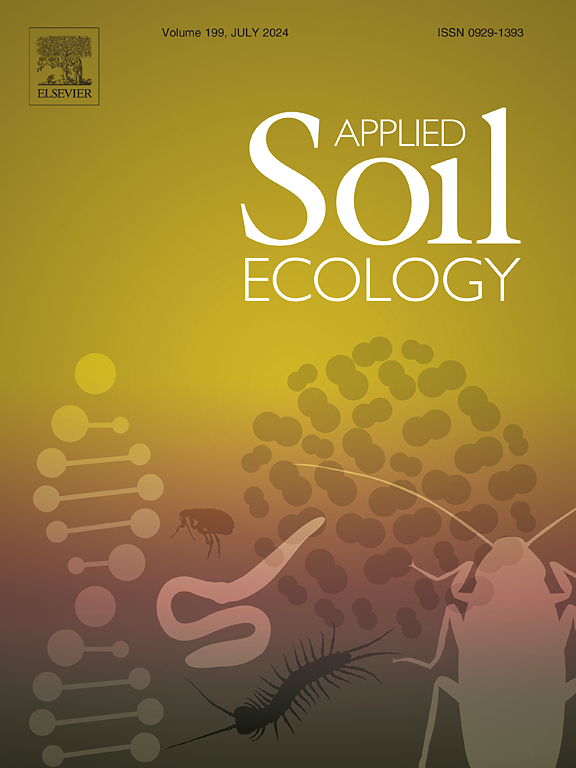土壤系统中的纳米技术:实现可持续管理的生态方法
IF 4.8
2区 农林科学
Q1 SOIL SCIENCE
引用次数: 0
摘要
土壤生态学在农业生态系统中具有重要意义,因为它对土壤、水、空气、动物、植物和人类健康等众多环境成分都有影响。由于土壤中的粘土、有机物和氧化物等成分可被归类为纳米颗粒范围,因此土壤系统与纳米技术有着不解之缘。从这个角度来看,土壤系统中的纳米技术是一个由来已久的话题,需要在当代纳米技术知识的框架内进行重新评估。纳米农业日益受到关注,并对土壤系统产生生态影响。本综述通过选定的问题重点讨论纳米土壤生态学,包括纳米修复土壤质量、土壤纳米施肥以改善作物生长、纳米作物保护、农业废物的纳米管理以及土壤中纳米毒性的潜力。还强调了基于纳米技术的可持续农业和全球农业界面临的预期挑战,包括土壤纳米颗粒相关毒性及其对土壤微生物群、植物和依赖土壤系统的人类等其他群体的影响。审查确认,基于纳米技术的可持续农业发展必须考虑纳米管理对土壤生态系统潜在毒性的影响。综述认为,纳米技术在改善农业系统的几乎所有方面(从播种前处理到包装和运输)都显示出前景。然而,在基于纳米技术的农业方面仍然存在几个亟待解决的问题。这些问题包括为避免纳米毒性对土壤生态系统造成负面影响,需要采取哪些措施或制定哪些法规?基于纳米技术的农业技术革命预计会遇到哪些障碍?各种纳米化合物对植物、动物和土壤微生物的预期毒性效应是什么?本文章由计算机程序翻译,如有差异,请以英文原文为准。
Nanotechnology in the soil system: An ecological approach towards sustainable management
Soil ecology is significant in agroecosystems due to its influence on numerous environmental components, including soil, water, air, fauna, flora, and human health. The soil system has a substantial history with nanotechnology, beginning with the recognition that soil itself is considered a nanosystems, as components such as clays, organic matter, and oxides found in soil can be classified within the nanoparticle range. From this perspective, nanotechnology in the soil system is a long-established topic that requires reevaluation within the framework of contemporary nanotechnology-based knowledge. Nano-farming is gaining increasing attention and has ecological consequences for the soil system. This review focuses on nano-soil ecology through selected issues, including nano-remediation for soil quality, soil nano-fertilization to improve crop growth, nano-crop protection, nano-management of agro-wastes, and the potential for nano-toxicity in soil. Expected challenges facing sustainable nanotechnology-based farming and the global farming community were also highlighted, including soil nanoparticle-associated toxicity and its impacts on soil microbiota, plants, and others, such as humans, that depend on the soil system. The review confirmed that sustainable nanotechnology-based farming development must consider the impact of nanomanagement on potential toxicity in the soil ecological system. It was concluded that nanotechnology has shown promise in improving almost all aspects of the agricultural system, from pre-planting treatments to packaging and shipping. However, several urgent questions regarding nanotechnology-based farming remain. These include the following: What practices or regulations are needed to avoid nanotoxicity that would negatively affect the soil ecosystem? What are the expected obstacles to an agrotechnological revolution based on nanotechnology? What are the expected toxic effects of various nano-compounds on plants, animals, and soil microbes?
求助全文
通过发布文献求助,成功后即可免费获取论文全文。
去求助
来源期刊

Applied Soil Ecology
农林科学-土壤科学
CiteScore
9.70
自引率
4.20%
发文量
363
审稿时长
5.3 months
期刊介绍:
Applied Soil Ecology addresses the role of soil organisms and their interactions in relation to: sustainability and productivity, nutrient cycling and other soil processes, the maintenance of soil functions, the impact of human activities on soil ecosystems and bio(techno)logical control of soil-inhabiting pests, diseases and weeds.
 求助内容:
求助内容: 应助结果提醒方式:
应助结果提醒方式:


